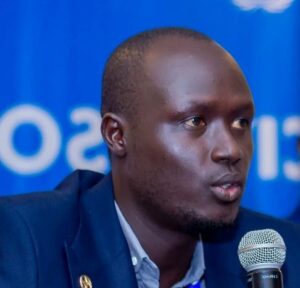
By Manas James Okony
A renowned civil society activist based in Bor, the capital of Jonglei State has raised concerns over what he described as a shrinking civic space.
Bol Deng Bol, the Executive Director of INTREPID South Sudan, expressed worries over intimidations in the state.
However, the state government denied the threat and intimidation of the activist.
The activist claimed that due to recent criticism of state government policies, he has been intimidated by some officials in the state government.
In a statement widely circulated on social media and allegedly issued by individuals associated with Governor Riek Gai Kok’s press secretariat, activist Bol Deng Bol was accused of creating and disseminating misinformation with the intention of inciting chaos within the state. The statement warned of severe repercussions for his actions.
However, in an interview with No. 1 Citizen Daily Newspaper on Monday, Bol claimed he is being targeted for his advocacy, which he insists is being mischaracterized as mere criticism.
He accused the government of employing intimidation tactics to silence dissenting voices.
“Governor Riek Gai has embarked on a policy of creating administrative units, a move criticized by many, including us in civil society; instead, we advocate for better service delivery. Furthermore, we highlighted the lack of confidentiality in the state when the names of those nominated for appointment by the president were leaked to the public. I believe this prompted the governor’s office to have a different perspective on our roles,” Bol explained. “As an activist, I feel intimidated, and these threats are aimed at silencing me.”
Bol added, “After being tagged in the post, I contacted the governor’s official secretary, but he stated that the press unit was not responsible for the statement, even though it bore the name of someone working within that unit. The press secretary did acknowledge that the individual is employed by his office but claimed he had not authorized the statement.”
Bol expressed his discontent regarding the shrinking civic space through acts of intimidation, stressing the importance of maintaining a vibrant civil society for fostering dialogue and accountability in governance.
In response, Manath Gany Lual, the press secretary for Governor Riek Gai, distanced his office from the threats directed at Bol.
He emphasized that the state values the contributions of civil society as essential stakeholders.
“The statement was issued on a Facebook page that does not belong to the state government, and no one has authorized it,” he asserted. “As a government, we cannot intimidate civil society. It is their right to hold us accountable. If we were to issue an official statement, it would carry our stamp and be clearly recognized as our position.”
In South Sudan, civic space has been under persistent threat, particularly since the country gained independence in 2011.
The government’s control over media and civil society organizations has grown tighter, with activists and journalists facing harassment, arrest, and violence for speaking out against state policies or practices. Intimidation tactics, including threats and actual violence, have created an environment where many feel compelled to self-censor.
This trend is particularly alarming given that civil society plays a vital role in promoting transparency, accountability, and the rule of law.




